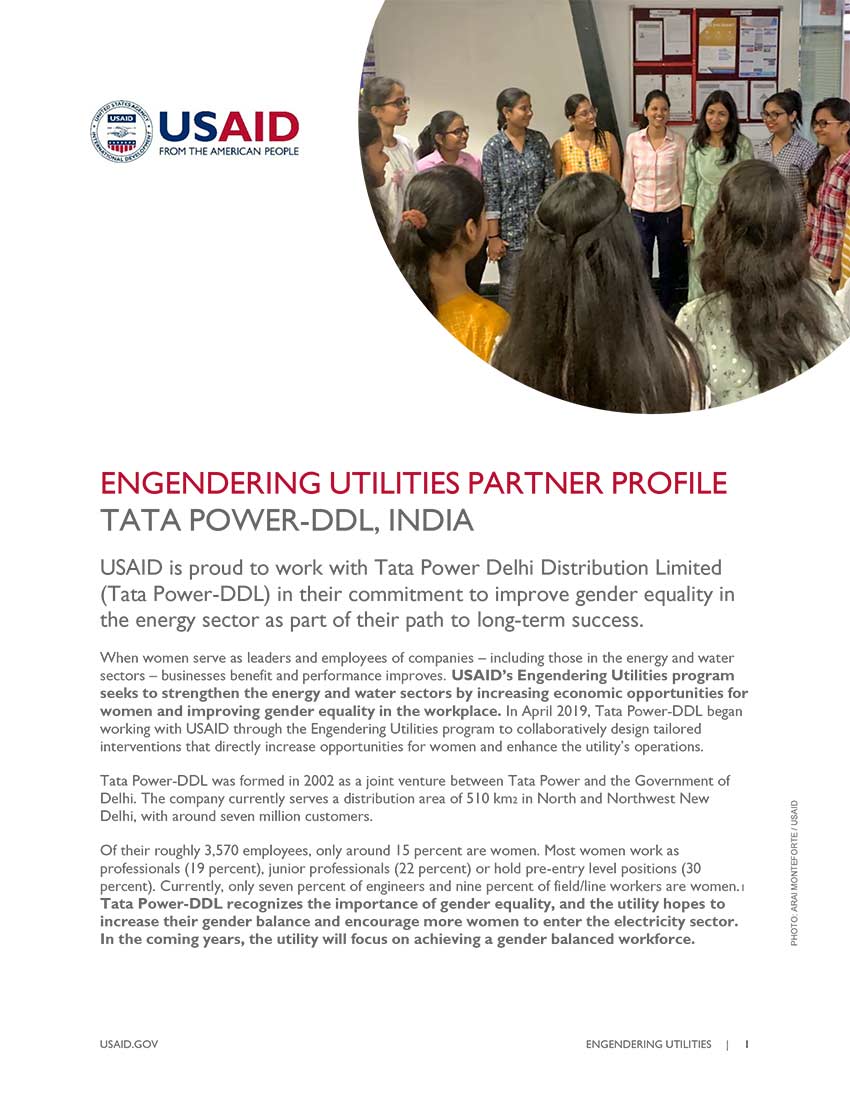- Energy Home
- How We Work
- Programs & Initiatives
- Smart Utilities
- Asia EDGE
- Auction Design Support to Colombia
- Energy Auctions for Kazakhstan’s Green Economy
- Energy Efficiency for Development
- Engendering Utilities
- About
- Business Case
- Approach
- Partners
- OSHEE, Albania
- SONABEL, Burkina Faso
- EDESUR, Dominican Republic
- DELSUR, El Salvador
- EEU, Ethiopia
- Energo-Pro, Georgia
- GRIDCo, Ghana
- BRPL, India
- TPDDL, India
- EDCO, Jordan
- IDECO, Jordan
- Miyahuna, Jordan
- KenGen, Kenya
- Kenya Power
- KOSTT, Kosovo
- LEC, Lesotho
- LEC, Liberia
- EGENCO, Malawi
- EDM, Mozambique
- EKEDC, Nigeria
- IBEDC, Nigeria
- ISWSC, Nigeria
- EVN, North Macedonia
- LASURECO, Philippines
- ZCWD, Philippines
- REG, Rwanda
- OFOR, Senegal
- Senelec, Senegal
- EVN, Vietnam
- Resources
- Stories
- Institutional Framework for Auctions in Mexico
- Powering Agriculture
- The USAID-NREL Partnership
- Scaling Up Renewable Energy
- EmPOWERing Women and Girls
- Competitive Energy Procurement
- Toolkits
- Monitoring & Evaluation
- Resources
- Stories
Speeches Shim
Engendering Utilities Partner Profile
TPDDL was formed in 2002 and serves around seven million customers in New Delhi. Of their 3,570 employees, around 15 percent are women. USAID is proud to work with TPDDL in their commitment to improve gender equality in the energy sector as part of their path to long-term success.
India is now the third-largest producer and fourth-largest consumer of electricity in the world. The country has around 350 GW of installed generation capacity, from a combination of conventional fossil fuels, nuclear, hydro, wind, solar, agricultural waste, and domestic waste. Renewable energy is the fastest-growing source, and the Government of India released a roadmap to install 175 GW of renewable energy capacity by 2022.
India’s energy sector remains male-dominated. According to the International Labor Organization, India has one of the lowest women’s labor force participation rates, with women making up less than a quarter of the total labor force. Furthermore, Indian women are not well represented in most sectors, and only roughly nine percent of firms have female top managers.
USAID is partnering with TPDDL through the Engendering Utilities program to assess and identify high-impact interventions that can improve gender equality within the organization. Through Engendering Utilities, USAID is supporting TPDDL staff on gender equality and business best practices, and a dedicated change management coach provided by Engendering Utilities is working with TPDDL to identify opportunities to empower women to seek leadership opportunities, and select utility personnel are participating in the Gender Equity Executive Leadership Program in collaboration with Georgetown University. Through this coaching, the utility will develop a tailored action plan to best fit their needs. TPDDL will also place a strong emphasis on engaging influential male leaders as champions of gender equality.
-
© Tata Power-DDL
-
Featured Story
-
Ryan Kilpatrick / USAIDAnnouncement


Comment
Make a general inquiry or suggest an improvement.